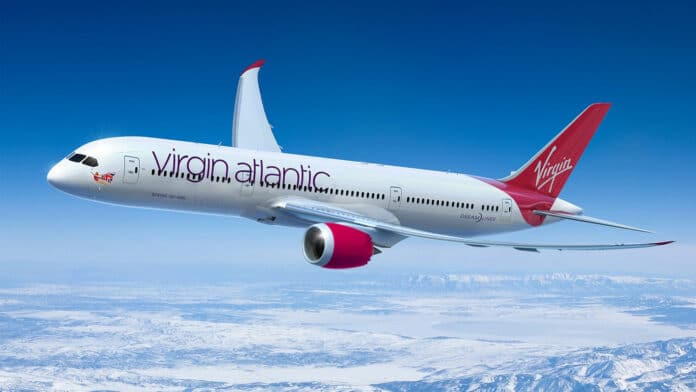Virgin Atlantic plans to launch the world’s first transatlantic flight powered solely by waste oils and fats – a move hailed as a step toward reducing aviation’s significant environmental impact.
The U.K. government has announced that Virgin Atlantic won a competition to receive government funding for the first net-zero transatlantic flight that will take off from the U.K. next year, fueled entirely by sustainable aviation fuel (SAF).
The airline will work with a consortium that includes Rolls-Royce, Boeing, Pratt & Whitney Canada, Imperial College London, the University of Sheffield, RMI, and ICF.
SAF is an alternative to fossil fuels that uses ingredients like cooking oils and agricultural waste. When fully replacing kerosene, SAF can slash lifecycle carbon emissions by more than 70% compared to conventional fossil jet fuel.
In 2023, one of Virgin Atlantic’s flagship Boeing 787s, powered by Rolls-Royce Trent 1000 engines, will take off from London Heathrow and make the journey to New York’s John F Kennedy Airport, according to an official press release by the U.K. government. This net-zero transatlantic flight is expected to be fuelled by SAF, made primarily from waste oils and fats, such as used cooking oil. The usage of 100% SAF, combined with carbon removal using credits for biochar – a material that traps and stores carbon taken from the atmosphere – will make the flight net zero.
“For decades, flying from London to New York has symbolized aviation’s ability to connect people and drive international progress. It’s now going to be at the forefront of cutting carbon emissions from flying,” Transport Secretary Mark Harper said. “Not only will this flight pave the way for future generations, but it will demonstrate just how much we can achieve when we work together on a shared goal – bringing together some of the best businesses and academics in the world and led by a British airline.”
Aviation, one of the hardest sectors to decarbonize, could be one of the highest-emitting sectors for greenhouse gases by 2050 if no urgent collaborative action is taken. To tackle this, the U.K. government published the Jet Zero strategy in July 2022, outlining an approach to decarbonizing the sector and highlighting SAF as one of the main tools for achieving Jet Zero.
However, there are still some difficulties, such as scaling up SAF production and the existing limit on how much SAF is permitted in jet engines by current fuel specifications. Currently, a maximum of 50% SAF blended with kerosene can be used in commercial jet engines. By using 100% SAF, the consortium will demonstrate the potential to decarbonize long-haul routes and bring us a step closer to net zero aviation.
